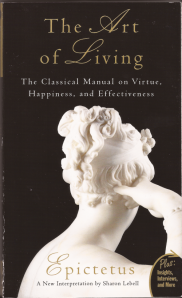I’m reading Epictetus – The Art of Living, A New Interpretation by Sharon Lebell. More correctly, I read it in a few hours, and I’m referring to it and re-reading it often ever since. In my opinion, this book is more valuable than the bible. It can be read in a matter of a few hours, it’s easily understood and applied to real life, and it and contains a wealth of knowledge that can help you lead a better life, avoid failure and attain success. It’s been around for almost 2000 years in Western culture as well. Why have so few people heard of this?
 The author explains Epictetus’ character and motivations, and I found he resonates with me. I seem to think like him: an appreciation of the role of discipline in self improvement, upset by others who are interested in ‘being clever’ rather than doing their job well, and bored by people who use too many words. To quote from Lebell’s book:
The author explains Epictetus’ character and motivations, and I found he resonates with me. I seem to think like him: an appreciation of the role of discipline in self improvement, upset by others who are interested in ‘being clever’ rather than doing their job well, and bored by people who use too many words. To quote from Lebell’s book:
Epictetus nevertheless staunchly believed in the necessity of training for the gradual refinement of personal character and behavior. Moral progress is not the natural province of the highborn, nor is it achieved by luck, but by working on yourself – daily.
Epictetus would have had little patience for the aggressive position-taking and -defending and verbal pirouettes that unfortunately sometimes pass for “doing” philosophy in today’s universities. As a master of succinct explanation, he would have been similarly suspicious of the murky verbiage found in academic, philosophical, and other dry texts. Inasmuch as he passionately denounced displays of cleverness for its own sake, he was committed to non-patronizing explanations of helpful ideas for living well. He considered himself successful when his ideas were easily grasped and put to use in someone’s real life, where they could actually do some good at elevating that person’s character.
Epictetus seemed to live an interesting life, as one might expect from a Stoic. He did exactly what I wanted to do with my blog – write a simple concise manual for success, although I don’t think this was necessarily his initial intent.
Epictetus was born a slave about A.D. 55 in Hierapolis, Phrygia. His master was Epaphroditus, Nero’s administrative secretary… [Epictetus was sent] to study with the famous Stoic teacher, Gaius Musonius Rufus. Musonius Rufus’s works, which survive in Greek, include arguments in favor of equal education for women and against the sexual double standard in marriage… Epictetus taught in Rome until A.D. 94, when the emperor Domitian, threatened by the growing influence of philosophers, banished him from Rome. He spent the rest of his life in exile in Nicopolis, on the northwest coast of Greece. There he established a philosophical school, and spent his days delivering lectures on how to live with greater dignity and tranquility. Among his most distinguished students was the young Marcus Aurelius Antonius, who eventually became ruler of the Roman Empire. He was also the author of the famous Meditations, whose Stoic roots were in Epictetus’s moral doctrines…
For Epictetus, a happy life and a virtuous life are synonymous. Happiness and personal fulfillment are the natural consequences of doing the right thing… Part of his genius is his emphasis on moral progress over seeking moral perfection. With a keen understanding of how easily we human beings are diverted from living by our highest principles, he exhorts us to view the philosophical life as a progression of steps that gradually approximates our cherished personal ideals… professional achievement, wealth, power… Epictetus views these as incidental and irrelevant to true happiness. What matters most is what sort of person you are becoming, and what sort of life you are living.
First say to yourself what you would be,
then do what you have to do.
